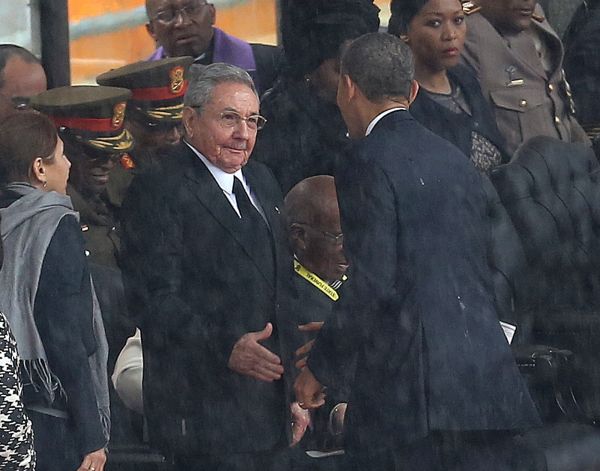 I WAS THRILLED THAT President Obama showed the right stuff and shook Cuban leader Raúl Castro’s hand during the memorial service to Nelson Mandela.
I WAS THRILLED THAT President Obama showed the right stuff and shook Cuban leader Raúl Castro’s hand during the memorial service to Nelson Mandela.
Mandela, who embodied the very essence of reconciliation and used it as a tool to heal post-apartheid South Africa, would no doubt have approved.
The outcry by outraged Cuban Americans and right-wingers exposed how they have been able to shape the American public’s perception of Cuba as a land of oppression, and Raúl Castro as a “tyrant.” In congressional hearings two days ago, for example, Cuban-born Florida Rep. Ileana Ros-Lehtinen said that Obama had shaken “the bloody hand of a ruthless dictator.”
For those of us who have spent considerable time in Cuba, such rhetoric is very wide of the mark. Yes, Cuba restricts free speech and suppresses dissent, as Secretary of State John Kerry acknowledged in reply to Ros-Lehtinen’s heated outburst. Indeed, during his eulogy President Obama said: “There are too many leaders who claim solidarity with Madiba’s struggle for freedom, but do not tolerate dissent from their own people.” That was clearly aimed, not least, at Raúl.
But “tyrant”? Ridiculous! After twenty years of travel to and study of Cuba, it’s very clear that as many Cubans have an abiding affection for Castro and the Revolution as do not. Not least because their understanding of “human rights” is that it includes everyone’s right to guaranteed free health care. They appreciate that Cuba eradicated illiteracy five decades ago; that everyone now has a roof (however humble) over his or her head; and that the state protects against malnutrition and measles.
The Obama-Castro handshake reminded me of a very moving moment during my visit to Cuba last week while leading a National Geographic Expeditions’ ‘Cuba: It’s Culture and People’ expedition.
I took the group to a reception by a local community, hosted by their Committee for the Defense of the Revolution. As explained to us by the welcoming committee, comprising ordinary citizens, the CDRs were established in 1961 for “collective vigilance” on the eve of the fatally flawed CIA-sponsored Bay of Pigs invasion by Cuban-American exiles; and shortly after the U.S. enacted a trade embargo that still hangs like an axe over Cuba. The embargo even bans medical equipment! Explain that to the Cuban on the street!
Much as they may blame their own government for their woes, Cuban citizens also know full well that the six-decade-old embargo punishes them and worsens their daily lives. For example, they’re well aware that the Cuban Democracy Act (“Torricelli Act”) of 1992 slammed the door shut to food sales to Cuba after the collapse of the Soviet Union, in the hope of causing Cuba’s economic collapse. Food! Who paid the price? Ordinary Cuban citizens. (No doubt they have a very different definition for “tyrant.” In ordinary Cubans’ eyes, Rep. Ileana Ros-Lehtinen may see a “tyrant” whenever she looks in a mirror.)
Despite which, the CDR meeting began with a young girl reading a poem—Cultivo una rosa blanca—by Cuba’s national hero, José Martí:
Cultivo una rosa blanca
en junio como enero
para el amigo sincero
que me da su mano franca.
Y para el cruel que me arranca
el corazón con que vivo,
cardo ni ortiga cultivo;
cultivo la rosa blanca.
Translation:
I cultivate a white rose
in June as in January
for the sincere friend
that gives me his open hand
And for the cruel one who tears out
the heart that I live by,
neither thistle nor nettle do I cultivate;
I cultivate a white rose.
Nelson Mandela would have approved. More so, because the brother of the CDR president—a generous, warm-hearted 80-year-old named Teofilo Humberto Suarez Aramas—died defending Cuba in the Bay of Pigs fighting.
Magnanimity begins with a handshake.
Perhaps Rep. Ileana Ros-Lehtinen and her like should do some self-reflection with Mandela’s own words in mind: “No-one is born hating another person… They must learn to hate, and if they can learn to hate, they can be taught to love, for love comes more naturally to the human heart than its opposite.”
Now see Mavis Anderson’s always intelligent Latin American Working Group blog: Obama and Castro Shake Hands and Bring Positivity to the State of U.S.-Cuba Relations

